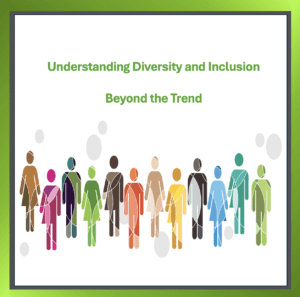Understanding Diversity and Inclusion: Beyond the Trend
In today’s fast paced and interconnected world, Diversity and Inclusion D&I have emerged as crucial components of a successful and ethically sound workplace. However, it is imperative to understand and implement D&I not as a mere trend or a box to tick, but as a fundamental strategy that enhances organisational performance and employee well-being.
What is Diversity and Inclusion?
Diversity refers to the presence of differences within a given setting, encompassing race, ethnicity, gender, age, sexual orientation, disability, and more. It acknowledges the individual uniqueness, and the variety of perspectives people bring to the table.
Inclusion, on the other hand, is about creating an environment where these diverse individuals feel respected, valued, and integrated into the fabric of the organisation. It involves cultivating a culture where everyone has equal opportunity to contribute and succeed.
Why D&I Should Be Implemented Correctly
- Driving Innovation and Creativity: Diverse teams are more likely to introduce innovative ideas and solutions. When people with varying experiences, perspectives, and approaches collaborate, they can challenge the status quo, leading to greater creativity and problem-solving capabilities.
- Enhancing Employee Engagement and Retention: An inclusive workplace encourages a sense of belonging among employees. When individuals feel valued and recognised for their unique contributions, they are more engaged and committed to their organisation’s goals. This reduces turnover rates and the costs associated with hiring and training new employees.
- Improving Organisational Reputation: Companies that prioritise D&I are often viewed more favourably by consumers and potential employees. A genuine commitment to diversity enhances an organisation’s brand and can attract top talent, as people prefer to associate with companies that reflect their values and commitment to social responsibility.
- Boosting Financial Performance: Numerous studies have shown that organisations with diverse and inclusive cultures tend to perform better financially. Diversity can lead to significant returns by broadening the company’s market reach and improving decision-making processes, thanks to the varied perspectives involved.
- Ensuring Compliance and Minimising Legal Risks: Implementing effective D&I practices helps organisations stay compliant with anti-discrimination laws and regulations, reducing the risk of legal actions. It also demonstrates a commitment to equity and fairness, adhering to ethical standards.
Avoiding the Tick-Box Approach
While the benefits of D&I are clear, it is essential for organisations to implement these practices authentically rather than as a mere trend or compliance requirement. A tick-box approach can lead to superficial efforts that fail to address the underlying issues or bring about lasting change.
Here’s how to ensure D&I is more than just a checklist:
- Commitment from Leadership: Leaders must embrace D&I as a core value and actively support initiatives that promote inclusivity. This includes ongoing education and challenging biases at all levels of the organisation.
- Developing Tailored Strategies: Generic programs often fall short. Organisations should craft strategies that reflect their specific circumstances and goals, considering the diverse needs of their workforce.
- Supporting Continuous Improvement: D&I should be treated as an evolving practice, with regular assessments and adaptations based on feedback and outcomes. This commitment to continuous improvement ensures that initiatives remain relevant and effective.
- Engaging All Employees: Inclusivity requires an organisation-wide effort. Employees should be encouraged to participate in D&I initiatives, providing input and sharing ownership of the outcomes.
In conclusion, Diversity and Inclusion are not just ethical imperatives but essential components that drive organisational success.
By moving beyond a compliance mentality and embedding D&I into the core organisational strategy, companies can create a thriving, dynamic, and equitable workplace for all.
If you would like to find out more, contact 07745 535 635.

